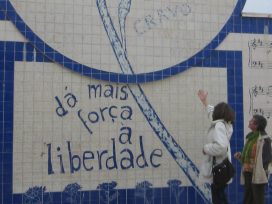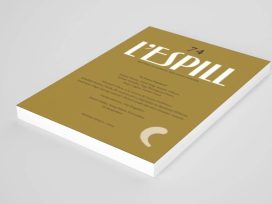Mercè Rius, Daniel Gamper: At university, you began studying medicine but first changed to law and then to philosophy. One of your best-known books, recently translated into German, is called Per què filosofia? (“Why philosophy?”) So why not philosophy from the start?
Xavier Rubert de Ventós: When I told my father, who was a lawyer, that I was thinking of studying philosophy, he responded with an ironic, “Now, that’s really something. I see you’re not going to be happy with any kind of work that isn’t in direct connection with the truth.” I was discomfited by his observation. He knew what he was talking about. Since his student days at the republican Autonomous University in the 1930s, my father had had philosopher friends, in particular Josep Maria Calsamiglia and Jordi Maragall Noble, but also Joaquim Xirau, Eduard Nicol, and Josep Ferrater Mora. These were men who during the Franco dictatorship suffered everything from academic ostracism through to exile. In any case, my father was right. I did want to be, as Ors had said at the beginning of the century, “a specialist in general ideas”.
Then again, there was my enthusiasm for football. I played in the Barça boys’ team (“more than a club”, in those years of anti-Franco resistance). When you’re fifteen and they tell you you’re good, you’re dazzled. The one who really rattled me, though, was my uncle, the philosopher Joan Teixidor, who said: “Think that by the time you’re thirty you can be an old footballer or a young philosopher.” He convinced me, and I enrolled for medicine. But medical practice wasn’t for me. However the phenomenon of life captivates me, affects me, moves me. I can’t come to terms with the idea of being a piece of mindlessly accelerated nature. The question about that which can’t be stopped without it starting to stink is still, even now, the one that thrusts me into philosophical reflection. I confess that thinking puts me on edge and that I only do it if there’s no alternative – when something, good or bad, amazes me, when it disturbs me, wrongfoots me. Then, yes, I do try to understand it. Either that or I watch telly, tertium non datur. In fact, a good part of Per què filosofia? comes from weekly sessions prepared for a television programme.
No, philosophy wasn’t my first academic option and nor do I want to spend my old age as a “practising intellectual”. I’ve seen more than one of international renown – Roland Barthes, to give one example – be completely taken aback by the observations of someone younger, in this case myself, when I must have been about thirty. I recall that it didn’t seem to matter to that gentleman, whom I admired, whether my questions or objections represented any clear understanding of his thought. In fact, my aim was little more than to “put matters on the table”. The only thing that did seem to concern him was whether I was for or against his ideas. I came to the conclusion that dying as an intellectual meant dying in a very vulnerable state. So, I don’t know, maybe I’ll end up being a rural landowner or something like that.
MR, DG: When you began with philosophy, you went to Madrid to study under José Luis López Aranguren, despite that fact that Aranguren worked mainly in the field of ethics, while your first writings were about aesthetics. We refer to your degree thesis, “El arte ensimismado” (“Art engrossed”, 1963) and your doctoral thesis, “Teoria de la sensibilitat” (“Theory of sensibility”, 1969). Then came other works such as “La estética y sus herejías”, which was translated into English under the title “Heresies of modern art”.
RdV: In fact, my first published writing was a letter to the editor of La Vanguardia criticising Nato’s decision to consider the Soviet invasion of Poland as “an internal affair” so that they could shelve it. But my first theoretical article dealt with what I have later seen is called “the dissonance principle”, which might be summarised thus: If you don’t do what you believe in, you’ll end up believing in what you do. It had nothing to do with aesthetics. My preferences even then were the same as now, the critique of knowledge and morality. However, my uncle’s library gave me access to the classics of artistic modernity and, in particular, avant-garde art, which was one of those things that irritated me and that provoked me to a theoretical response. I didn’t share the smugness of the 1960s and, of all the manifestations of the period, its aesthetic discourse was the most flimsy and the easiest to submit to criticism. At the same time, this was my initiation into academic work. Moreover, since, unlike matters of morality, aesthetics didn’t impinge upon me much, I was able to adhere to the classical model of “disinterested knowledge”. Later, for political reasons that are not relevant here, I didn’t get the Chair in the Faculty of Philosophy but in the School of Architecture. There, as I later experienced in politics, I really did come into contact with reality. In philosophy there is no possible application, while the politician is a man who makes decisions. Although architecture and politics had this advantage, the drawback was the impossibility of any dialogue that wasn’t restricted to short-term interests. When I began to reflect in strictly philosophical terms, I saw that people weren’t following me. And I knew I couldn’t go on.
Just as I couldn’t stand the rhetoric of the avant-garde, neither could I bear the ideological discourse of the different strands of Marxism at the time. I preferred to act and not to argue about Marxist scholasticism. Hence, in the early 1960s, I ended up in the police station more than once. In Madrid they nabbed me in a demonstration with forty-two women while I was studying philosophy there under Aranguren. He represented the progressive standpoint and introduced me to Eugeni d’Ors. Above all, he was a great teacher; my apprenticeship with him was intense. I got the idea of going to study with Aranguren when I read his book Catolicismo y protestantismo como formas de existencia (“Catholicism and Protestantism as forms of existence”), which was published in the 1950s. It was after a stay in England, where I had converted to Protestantism, if one may put it like that.
MR, DG: Are you speaking figuratively about this question of conversion?
RdV: Well, it was a “conversion” – both mental and affective – that only lasted five months. I’d just read Rudolf Otto’s The Idea of the Holy. I’d been struck by his radical disposition, which resembled what I’d later find in Kierkegaard, one of the writers with whom I have felt and still feel closest. It was a matter of the fear and trembling inspired by the ganz anders (wholly other). So I thought if there was a God, if such a boundless thing existed, at least it would be a good idea to have a direct, unmediated relationship with him, like the Protestants do. I went to some lectures on Protestantism and ended up sipping tea after the religious service with the ladies of the parish and the reverend. In these social gatherings, the Anglican Church turned out to be even worse than the Catholic Church. So I unconverted.
MR, DG: You mentioned Eugeni d’Ors, saying you discovered him thanks to Aranguren. Wasn’t there something a bit roundabout in going to Madrid to find out about the work of a Catalan thinker?
RdV: Of course there was! Aranguren had written a book on Ors’s philosophy in his youth. Ors’s Glosari (“Glossary”), which had been brought out by the old publishing house Selecta, also came into my hands. So there you have it, in the midst of the generalised redundancy, Ors turned one’s head and opened one’s eyes. I was delighted. More than his theses, I was seduced by his twist on matters. He made me see things in ways that I hadn’t realised. Ors was impertinence personified in a straitjacketed country. If you’ll permit a “nifty” turn of phrase, we are such a common-sense country that our madmen merely become artists. It’s very difficult to generate enthusiasms here. Even so, I still got enthusiastic later on over another of our thinkers who died very young: Joan Crexells. He taught me that nothing could be “absolved” from its determining factors – psychological, sociological, historical, et cetera – nor really “resolved” either, to give an ad hoc synthesis. For me, the gravest sin of all, now and always, is to postulate that man needs to believe in order to remain consistent. Hence my moral aversion to the application of principles and this formulation of “I never”. The morality I stand for doesn’t include this “never”.
MR, DG: In the early 1970s you were taught at the universities of Harvard and Berkeley. Could you tell us what the atmosphere was like?
RdV: Yes, they appointed me Santayana Fellow at Harvard University. This is a position conceded each year to a young philosopher. The title of “Professor” is bestowed and the incumbent can use it thenceforth. The selection ceremony – a lunch-interrogation with the president of the university at the head of the table (and there the president has a very high institutional standing) – was the most solemn I’ve ever experienced. I’d been officially introduced by the poet Jorge Guillén after my stay at Berkeley. So I went there having immersed myself in counterculture at the Californian university, where my classes were received with “Beautiful!” and where I enjoyed subversive performances by groups of hippies and feminists. (In Barcelona, the home-grown version of sexual liberation – more token than anything else, one must say – had its headquarters in the night club Boccaccio.) The contrast with Harvard was huge. I was faced with voracious students who were ready to squeeze me dry and dredge all my knowledge. I had to work like a navvy preparing the classes they’d asked me to give on Unamuno and Ortega y Gasset, two writers with that touch of Spanish dramatics that I didn’t share.
As is well known, in American eyes a hispano can or must be interesting but not intelligent. Harvey Cox, who was professor of theology at Harvard, was kind enough to write a prologue (he could read Spanish) for the English edition of my book on moral philosophy, Self-Defeated Man. It was full of cliché folklore references and “Spanish anarchism”. Cox was a good example of the Christian progressive trend at the time; I also met Nozick, Quine, Rawls, MacIntyre… Nelson Goodman was on sabbatical and they installed me in his office.
MR, DG: What was your impression of Rawls’s political thought? Did he influence your own liberalism?
RdV: I didn’t draw any theoretical conclusions about Rawls while I was at Harvard because I read his A Theory of Justice on the plane on my way back home. Moreover, we didn’t see each other much. I only had lunch with him a couple of times, once in the company of Norbert Wiener, who did impress me deeply. Among the moral philosophers, the one I liked most was MacIntyre, who didn’t teach at Harvard but at Boston University. As for the liberals, the great names, as far as I’m concerned, are John Stuart Mill and Isaiah Berlin. In Rawls’s work I find social-democratic goodwill in search of a credible-pragmatic formulation. But I know where he’s trying to go. With Rawls, the effect was exactly the opposite of what I’ve told you about with regard to Ors. I accept his theses on political liberalism but the path he describes doesn’t “fertilise” me.
MR, DG: But you’ve always said you were a Kantian. So aren’t you attracted by Rawls’s very well grounded normative apparatus?
RdV: In Kant, I’m not so much attracted by the normative aspects of his work as by his constant awareness of our own limits and, along with that, all the questions we can’t answer although we can’t stop asking them either. I am a lawyer – at least I have a degree in law – who is allergic to the law. For years, I suffered the distress of moving around the world without papers because the Franco authorities had confiscated them. (On one journey to England I had serious problems as a result of not having passport.) Even today, I feel absurd gratitude towards the policeman who asks for my driving licence and then lets me go without penalty. I’m sure my allergy to the law comes from this, even though I’ve always enjoyed the optimum social conditions for appreciating it. I mean the rich try to be above the law and the poor try to manage beneath it. It doesn’t mean the same thing for everyone. In short, the law doesn’t make me feel as soothed as it should, so in this regard I don’t see myself as a liberal. To return to Rawls, I don’t deny that normativism constitutes the most appealing aspect of his work, although for me it’s totally alien. Whereas I like reading some fascist writers such as Céline, Drieu La Rochelle, and another whose name escapes me…
MR, DG: Ernst Jünger, perhaps?
RdV: No, no way! In his Paris Diaries he describes how he kept the last letters of people who were condemned to death by the Nazis during the war and, with icy elegance, justifies the convenient circumstance that they never reached their destinies. In contrast, Drieu La Rochelle and Céline accept their human condition without making excuses. I too am a man and don’t like being one either. I feel strange about it, bad, uncomfortable, hung-up, perplexed. If my philosophy has been of any use to me, it’s been to situate my monstrous condition within an order of general discourse. I feel affinities with Céline, Drieu, and more and more with Marx. I’m more radical ideologically. Once I was surprised by people who became radical when they got old. But it’s happening to me too. I think that if, to cap it all, someone’s created man, if there’s a God that lets a mother see her child die in her arms in a bombing attack, I don’t want to know him.
In Dios entre otros inconvenientes (“God and other inconveniences” – 2000), I focused on the theme of religion, the “myth”, as a crystallisation of atavisms that reconstructs – on the symbolic level – instinctive solidarity that has been undermined by the development of “logos” (Bergson has bequeathed us a magnificent description of the process). Hence, for example, the thrill associated with physical defencelessness takes on a very different slant when it is linked with religious emotion: atavism is transformed into a sense of the sublime. Nonetheless, given present-day circumstances, tragic religions might very well be needed so that we can keep going. Or mysticism or fanaticism. A moral socialised God no longer responds.
MR, DG: Could you tell us about the Barcelona-New York Chair, of which you were one of the founders?
RdV: This was an exciting experience. We got the Chair started in 1979 despite many difficulties, since we only had the small amount of money from the grant that Pasqual Maragall was able to give us as Lord Mayor of Barcelona. The adventure lasted seven years. The idea of learning our language was very well received in New York. I remember that we spoke Catalan with Ambler Moss, Carter’s ambassador to Panama and signatory to the only progressive treaty pertaining to the area. If I’m not mistaken, he’d been a consul in Barcelona. I was lucky with the people I met: Susan Sontag, Richard Sennett, David Stella – the New York intellectual circle, in other words. All sorts of people came from Catalonia to participate in conferences and congresses, from politicians like Jordi Pujol through to singers like Raimon, and our plastic artists as well, of course. In brief, the experience was a good preparation for my period in politics, which I embarked upon after the first three years of the Chair’s being operative, first as a member of the Spanish parliament and then in the European parliament. Thanks to the good offices of Monsignor Hickey, archbishop of Washington, I managed to organise the presence of Monsignor Rivera, archbishop of San Salvador, at a Congress I organised in Washington, so that Felipe González could negotiate with Ronald Reagan the terms of Spain’s entry into Nato.
MR, DG: Your work embraces a range of different philosophical perspectives – ethics, aesthetics, epistemology – and includes political reflection along with enquiries into the threshold between philosophy and literature. But since we don’t have enough time for that, we’ll ask you to tell us what your own preferences are.
RdV: I’m not interested in mysticism or physics, but only in what lets me intervene while still having its own logic, like organic tissue for example. I’m interested in phenomena that, although they are not boundless or incomprehensible, are beyond me in that they are not amenable to reduction by any analysis I might engage in. In this sense, my belonging to a lineage perplexes me more than the things that come out of me, by which I mean, whatever I might call original to me, my own. Everything that is beyond me, because I am a result of it rather than a generator – milieus that I do not know and shall not know: beliefs, routines, convictions, inertias – amazes me, surprises me, disconcerts me. This is why I’ve sought the lesser clauses of the ego. In De la modernidad (“On modernity”, 1980), which I believe is my best book, I called it a “non-Fichtean ego”. But I took my first steps in this direction with the book with which I feel most personally identified, Moral y nueva cultura (“Self-Defeated Man. Personal identity and beyond”, trans. 1975). I gave it that title because, at that time, description was assigned to “ethics” and prescription to “morality”. Now I’d say it was an attempt to counter the inertias of our species instead of being limited to merely describing them. I start out from the assumption that these inertias occur at both natural and cultural levels without there being, on the other hand, any clear distinction between them. Nature and culture increasingly overlap in psychological time and not just in historical time. The latter is what happened, when what was thought to be natural was revealed as cultural. And then we have the contrary, because much of what we believe to be cultural has ended up showing us its socio-biological roots. This would be one of the two essays I’m thinking of writing: one on the transfers between nature and culture and the other on the “principle of incompetence”.
In Moral y la nueva cultura I took the role, against the “man of principles”, of the person who knows how to make a game of circumstances. The different spheres for which we opt throughout our lives imply many others that we have sacrificed. Hence, in opposition to the tendency to universalise one’s own situation, we have the duty to remember that we are walking over the remains of all the other abandoned options. For example, in spite of the traditional sermons on the socialising power of the family, or recent appeals to demographic decline and the need to “make a country” (as we say in Catalonia), the fact is that having children is the most antisocial thing in the world. When you have them, you want them to live out their lives in better conditions than other people have. It’s no problem if that goes against your fundamental ideas. You hope that what you preach with all your heart will not come about and, moreover, you feel justified in it. Thus, in order not to cause more harm than the inevitable, one has to be very aware of the partiality of one’s choices. One has to know how to participate in the game rather than taking shelter behind principles. Now, the game I’m speaking of has nothing “playful” about it. Before playing, one has to discover the degree of attention and inattention that each person or each thing – morally – requires. If I squeeze too hard on the bird I’ve picked up I’ll end up with just the corpse in my hands. Yet, from the position of the one who “is acted on” instead of being the actor, I’ll know how to understand even the options that conflict most with my own. Another example: I want independence for Catalonia precisely because I understand the standpoint of the Spanish state. It is everything that is legitimate, and nothing more nor less than that, about that perspective that riles my fellow citizens, because the interests of both parties do not coincide or even complement each other, as once was the case.
MR, DG: Does this understanding vis-à-vis the options of the other foster tolerance?
RdV: I’d say it does. But note that I haven’t referred to tolerance but rather have raised the moral question in epistemological terms. Basically, it’s a matter of maintaining the precise distance that knowledge requires. This distance regarding the world that surrounds one can be attained in different ways. One that has always interested me is that which is characteristic of the reactionary (I referred to this earlier when I was talking about fascist writers). Another is that of the person in love. The erotic dimension gives you absolute distance with regard to the world in general. Just as Sartre said of La nausée. Humanised, gestaltised, objects suddenly cease to be so. In my case, my own face has only seemed strange when I’ve been amorously involved.
MR, DG: What are your views on the phenomenon that’s now being referred to as “loss of values”?
RdV: As if values were something that might exist or not! The “values” of a period or of a person are, if anything, the precipitate of the rhythms of transformation which that period or person has undergone. In this sense, not very long ago, history still happened slowly. Then, all of a sudden, events were occurring that were very real but which we hadn’t dared to imagine. This is precisely the kind of experience that I have a burning desire to think about. This is, I repeat, the occurrence in psychological time of what used to be protracted over historical time. Who was able to foresee the fall of the Berlin Wall? And what about human parthenogenesis, or cloning? We never even dreamed it could happen! But now destiny can be designed in such a way that design becomes our destiny.
I’m imagining a son, who has his own family, visiting his elderly mother in hospital where she lies in an irreversible coma. The doctor asks if he’d prefer them to pull out the plugs before or after the holidays. Here, the traditional response of “we’ll abide by the judgement of science” doesn’t hold. We are the ones who have to make the decision. If somebody has to kill her it must be us, the people who love her most. Here we have a huge limitation to our enlightened mentality. Just as we are not able to come to grips with the challenges we have brought about in our social life, neither is the enlightened response able to deal with our fears. Hence, you have to take on board the fact that you live in a world where you can decide a lot of things that you’d prefer not to be able to decide – going against your reiterated appeal to freedom.
In these circumstances, speaking judgementally of the crisis or loss of values means being ignorant of the narrative structure in which the transformation takes place. This is why I think the most sensible standpoint is the critical one. One must describe the evaluations themselves to the extent that, conversely, there are no pure facts that are independent of values. This is why I like to speak “naturalistically” of values.
MR, DG: Don’t you think it’s counterproductive to defend the independence of Catalonia with this kind of argument? Doesn’t it risk leading to more opposition than support? Furthermore, how do you imagine your readers will take your socio-biological digressions, not to mention readers with a certain feminist sensibility?
RdV: Maybe. I’m sorry about that. But I have to speak from the place where I am, and the most I can do is to try and explain it. Strictly speaking, it’s the only thing I can explain. I was referring to this with the “non-Fichtean ego”. When you try to gain a little understanding of everything that’s beyond you, the only way of approaching it consists in taking yourself as a symptom. I don’t go looking for theoretical sutures and neither do I think I should go looking for them. I settle for explaining the reaction I have to each thing because I understand that only my reactions are able to bring out – objectively – what the world that impinges on me is like. I am nothing but this repercussion. Again, if there is any chance of being effective or of conveying something worthwhile, it comes through this attempt. The religious person calls it “testament”; I prefer to call it “symptom”. Again, what the hell! In the words of Calderón de la Barca: “If I don’t say what I think, what’s the point of being mad?”
MR, DG: Is it possible to capture a particular character of Catalan philosophy that would distinguish it from Spanish philosophy, in spite of the ruptures that our tradition has suffered? We believe you’ve given us to understand that this is what you think. We propose, then, characterising it as a pronounced leaning towards aesthetics – which is even evident in Catalan thinkers who are lovers of theology – and also towards a certain positivism, one not always exempt of romanticism, with a clear preference for biology. Would you agree?
RdV: No question about it. It is the problematic compatibility between romanticism and the bidet. Neither angel nor beast, I represent the modest lifelong attempt to take everything at once, with a bit of sense, with dignity, or at least knowing what shame is. I am a version of this character-type you’ve just described – living uncomfortably in this skin, in these circumstances of ours.
MR, DG: One last footnote: Do you think philosophy can help people to be happy?
RdV: Not me. It just helps me to survive. To survive. That yes.






